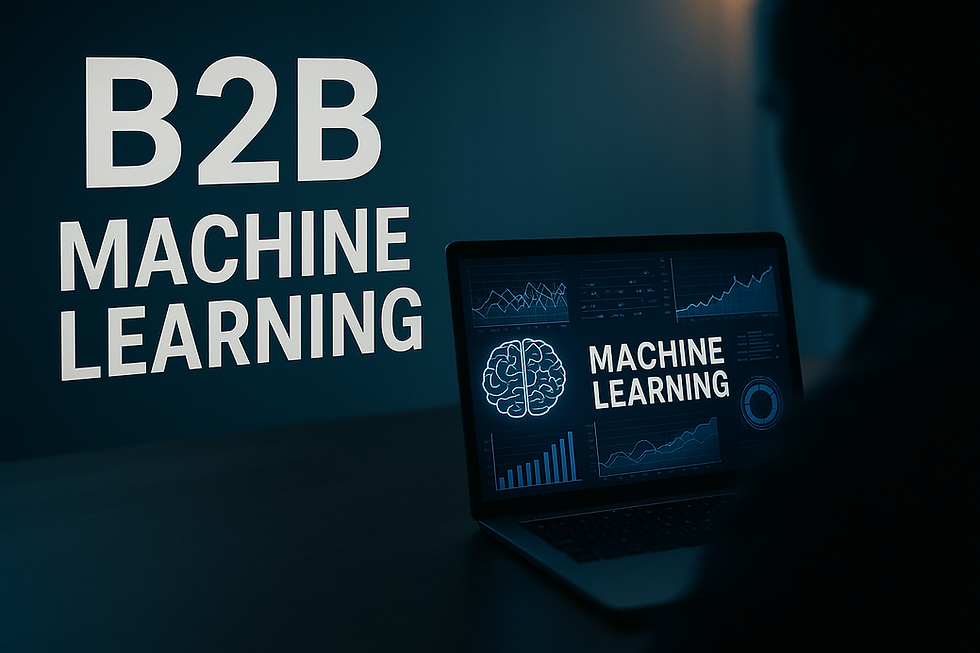Data Privacy Concerns in Machine Learning Sales Models
- Muiz As-Siddeeqi

- Aug 19, 2025
- 5 min read

Data Privacy Concerns in Machine Learning Sales Models
We didn’t ask for this. We didn’t opt in. But here we are—our buying habits, browser clicks, email opens, product views, even the time we linger on a page—all being tracked, analyzed, and predicted by complex machine learning models that know more about us than we’d ever tell a human being.
The machine doesn’t forget.
It doesn’t judge.
It just learns.
And then it sells.
But while that may sound like innovation—it also smells like intrusion. And in the race to drive revenue, businesses are now facing one of the most serious dilemmas of our digital era: how much of our customer’s privacy are we willing to compromise for performance, and at what cost to data privacy in machine learning sales?
Bonus: Machine Learning in Sales: The Ultimate Guide to Transforming Revenue with Real-Time Intelligence
The Invisible Currency: Your Data
Every single ML-powered sales model is fed by one thing: data. But what kind of data?
Personally Identifiable Information (PII): names, emails, phone numbers
Behavioral Data: clicks, scrolls, purchase history, time on page
Device Metadata: IP address, browser fingerprint, location
Third-party Enriched Profiles: demographics, income level, psychographic traits
Salesforce’s 2023 State of Data Report revealed that 78% of high-performing sales organizations rely heavily on customer data to personalize sales engagements. But that personalization often walks a fine line between “wow” and “whoa—how do they know that?”
And here lies the problem: most users never explicitly consented to this level of data processing.
When Sales Crosses the Line from Smart to Creepy
A 2024 study by the Pew Research Center found that:
79% of Americans are concerned about how companies use their data
64% have opted out of services due to privacy concerns
54% say they feel “watched” online
Let that sink in.
What began as a noble pursuit of efficiency—“show the right product to the right customer at the right time”—has in many cases transformed into silent surveillance, enabled by AI models trained on oceans of consumer data.
Machine Learning Models Don’t Just Use Data. They Amplify Privacy Risk.
Let’s break it down. ML models in sales are often used for:
Predicting churn
Scoring leads
Forecasting purchases
Personalizing outreach
Segmenting customer behavior
These models don’t just store data. They learn patterns that are often impossible for a human to unsee.
For example, DeepMind’s 2023 internal audit showed how anonymized hospital data used to train an AI system could still be reverse-engineered to identify patients due to subtle patterns in the dataset. While that wasn’t a sales use-case, the implications are universal.
Sales ML models can easily uncover:
Pregnancy based on changes in buying patterns
Income level based on browser type and session length
Relationship status based on gift purchase timing
This is not fiction. This is documented by The New York Times investigation into Target’s predictive analytics system in 2022, which identified pregnant customers before they had told their families—based purely on purchase data.
Consent Is Broken: The Illusion of Choice
Yes, websites show cookie banners.
Yes, apps have long privacy policies.
But do consumers really understand what they’re agreeing to?
The Norwegian Consumer Council’s 2023 report titled Deceived by Design showed that 97% of users simply click “Accept” without reading the policies—policies that often include clauses allowing data sharing with third parties, profiling by machine learning algorithms, and even cross-device tracking.
The illusion of choice is one of the deepest ethical wounds in sales AI.
Third-Party Data Brokers: The Hidden Puppeteers
You’ve probably never heard of Acxiom, Oracle Data Cloud, or Epsilon—but these companies likely know more about you than your closest friend.
They buy, sell, and aggregate data from:
Credit card transactions
Social media behavior
App usage
Voter registration databases
Public records
In 2023, Consumer Reports uncovered that Acxiom had up to 3,000 data points per consumer in its U.S. database.
These data brokers feed machine learning sales engines. But where’s the transparency? Where’s the consent?
Real-World Case: Clearview AI and the Legal Whiplash
Clearview AI scraped over 3 billion images from social media and public websites to build a facial recognition database. The company marketed its product to law enforcement—but in 2022, it was revealed that several retail and sales teams had also accessed Clearview’s service for identifying high-value in-store visitors.
After public backlash and lawsuits, Clearview was fined millions in the EU and banned in several countries.
Why does this matter in sales ML?
Because it shows how legally gray areas in data usage can blow up into legal disasters.
The Regulatory Storm Is Brewing
Here’s what’s coming for businesses using ML in sales:
1. GDPR (EU)
Requires explicit, informed consent
Grants users the right to know how automated decision-making affects them
Heavy penalties: Up to €20 million or 4% of global revenue
Example: In 2023, H&M was fined €35.3 million for unlawful profiling of employees.
2. CPRA (California)
Expands consumer rights on profiling and data sales
Mandates opt-out mechanisms for automated decisions
3. AI Act (EU) – Incoming
Risk-based classification of AI use cases
High-risk systems (including behavioral targeting) require full transparency, human oversight, and documentation
According to Forrester’s 2024 Compliance Benchmarking Report, 43% of sales departments are not yet compliant with GDPR or CPRA-level standards in their use of ML.
Data Poisoning, Model Leakage, and Shadow Profiles
The threats aren’t just legal. They’re technical. And they’re devastating.
Data Poisoning
Attackers inject misleading data into training sets—resulting in corrupted recommendations or biased lead scoring.
Example: In 2024, researchers at the University of Chicago showed how subtle data poisoning could make an AI model recommend financial products only to specific ethnicities based on historical data injection.
Model Leakage
Even if you delete the raw data, the ML model may still retain patterns. This is called memorization.
A Cornell Tech study (2022) showed that with just a few queries, researchers could extract PII from trained language models.
Shadow Profiles
Even if a person never interacts with your business, third-party data can construct a “shadow profile”, which your ML model may use to score or target them—without consent, and without recourse.
The ROI vs. Ethics Tug-of-War
Let’s be honest. ML in sales works. That’s why it’s everywhere.
McKinsey (2024): AI-driven personalization boosts revenue by 15-20%
Bain & Company: Lead scoring with ML improves conversion by 40%
Deloitte: ML-driven forecasting reduces inventory misallocation by 35%
But should we do it just because we can?
The pursuit of efficiency must not come at the cost of dignity, transparency, and consumer autonomy.
What Real Brands Are Doing (And What You Can Learn)
Apple
ML-based personalization happens on-device
No user data ever leaves the iPhone without consent
Introduced Private Relay to mask IP addresses
DuckDuckGo
Uses AI to improve search
Stores zero PII
Launched Tracker Radar, a public project to block third-party trackers
Proton (formerly ProtonMail)
Fully end-to-end encrypted SaaS
Built AI spam filtering that runs locally—never shares email content with cloud
These companies prove that privacy and AI are not mutually exclusive.
How to Build Privacy-Conscious ML Sales Systems
Here’s a real-world playbook, not fluff:
Data Minimization: Only collect what you truly need
Differential Privacy: Add statistical noise to training data
Federated Learning: Train models on-device, not in cloud
Explainable AI: Document how decisions are made
Ethics Committees: Regular internal reviews of ML usage
Data Subject Rights Portals: Let users see, download, and delete their profiles
Transparent Consent Layers: Short, clear, opt-in statements—not 14-page policies
Final Thoughts: Sales Should Feel Human—Not Like Surveillance
We’re at a crossroads.
Machine learning can make sales smarter, faster, and more profitable. But if it continues to evolve without ethical guardrails, it risks destroying the very trust that drives buying decisions.
Because customers may forget your CTA.
They may forget your price.
But they will never forget how your sales system made them feel violated.
Let’s build sales engines that don’t just close deals—but open conversations, earn consent, and protect the people behind the data.

$50
Product Title
Product Details goes here with the simple product description and more information can be seen by clicking the see more button. Product Details goes here with the simple product description and more information can be seen by clicking the see more button

$50
Product Title
Product Details goes here with the simple product description and more information can be seen by clicking the see more button. Product Details goes here with the simple product description and more information can be seen by clicking the see more button.

$50
Product Title
Product Details goes here with the simple product description and more information can be seen by clicking the see more button. Product Details goes here with the simple product description and more information can be seen by clicking the see more button.






Comments